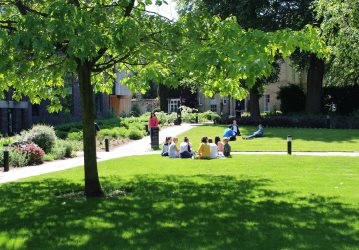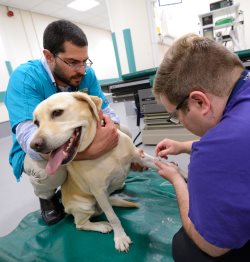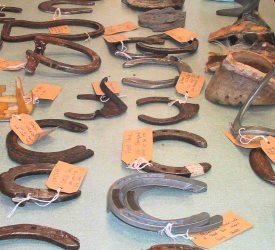Cambridge is a great place to live, work and enjoy yourself. As a vet student here, you will participate in the full ‘Cambridge undergraduate experience’ – enjoying the most busy and sociable years of your life, in a vibrant, beautiful city. So how does it all work?
 Life at a Cambridge college
Life at a Cambridge college
Cambridge is the only UK vet school where you can be part of a ‘collegiate’ university. This means that for your full six years you will be affiliated to a single college, where you will live for much of the time – but colleges are much, much more than just halls of residence.
Most importantly, for many students their college is a major focus of their social life. Obviously there are lots of vet-focused social activities across the University, but many student also spend a great deal of time chatting, socialising and generally having a good time with the other students at their college.
It is hard to express in writing why Cambridge students enjoy their time in college so much, but for many of them, it turns out to be a major reason why they are so glad they came here.
 Most colleges have 100-150 students in each year, studying the University’s full range of courses (Modern Languages, Engineering, History…), and many vet students form firm, life-long friendships with a wide circle of people with an enormous variety of interests. Perhaps this explains why our vet graduates have such an outward-looking, flexible and ambitious approach to their careers.
Most colleges have 100-150 students in each year, studying the University’s full range of courses (Modern Languages, Engineering, History…), and many vet students form firm, life-long friendships with a wide circle of people with an enormous variety of interests. Perhaps this explains why our vet graduates have such an outward-looking, flexible and ambitious approach to their careers.
Many of the work and recreation facilities our students use are actually college facilities – libraries, bars, computer rooms, sportsgrounds and music facilities – and colleges invest large amounts of money in these facilities. Colleges are also important in providing accommodation (see below) and generous financial assistance (see the ‘Help with your finances’ menu tab).
“Being in a college means you meet people from all different subjects and backgrounds and so enjoy a well-rounded University experience” - Henry
 How do the colleges support vet students?
How do the colleges support vet students?
Colleges are also important in guiding and supporting students. The University has the best pastoral care system in the UK – and each student is allocated a sympathetic college pastoral ‘tutor’ whom they can ask for advice if they experience financial, emotional, health or family problems. This is another way in which the individualised attention provided by Cambridge can be an enormous advantage, and a further reason why the University’s ‘drop-out’ rate is so low.
The Colleges are also essential in ensuring that our vet students reach their full potential, and also that they enjoy their time at Cambridge. Each vet student is allocated a Director of Studies to support them in their progression through the course, as well as a Vet School Clinical Supervisor to guide their extramural studies and professional development. Again, because most colleges have just a few vet students in each year, every student has many opportunities to discuss their progress.
Your college is also the venue for another unique feature of life at Cambridge – ‘supervisions’. This is a teaching session in very small groups within your college, usually only three or four students with one member of the teaching staff. Supervisions give students a great opportunity to further explore the material covered in whole-class teaching sessions. Supervisors are experts in their field and although they regularly report on your work, the supervisions are not formally assessed, so this is a great opportunity to take risks with your own ideas and investigate new topics.
“I cannot emphasise enough what a wonderful opportunity the supervisions have been” - Renata
How do I choose a College, and how important is it?The Colleges are one of the main reasons why being a Cambridge vet is so enjoyable and rewarding, but you certainly should not worry about the choice of college to which you apply. Instead, you should view it a positive decision allowing you to choose where in the University you would live and study, especially for your first three years.
- Also, colleges which take more vet students tend to get proportionally more applicants anyway. - Admission processes are coordinated and standardised across the colleges. Bear in mind that if you can't come to a decision about a chosen college, you can make an 'open application', by which you would simply be allocated to a college which will then consider your application as if you had applied directly to them. That said, most applicants do decide on a favourite college, and go for it! Although most colleges offer similar facilities, they vary in location, size and age. The best way to find out more about the colleges is to peruse their own individual websites, or you can book onto a college open day – just look at colleges' admissions websites to find out what they might be able to offer. (Please note that the following colleges do not admit students to read Veterinary Medicine: Christ's, Clare Hall, Corpus Christi, Darwin, Hughes Hall, King's, Peterhouse, and Trinity). Another advantage of the collegiate system is that if you have any queries about your application, you can send them directly to an individual college's admissions office, and they will be answered by the administrators, admissions tutors and veterinary staff who would consider your application. |
Accommodation for vet students
Accommodation in Cambridge is of high quality, and can be surprisingly inexpensive.
 For the first three years of the usual six-year course, vet students are classed as ‘undergraduates’. This means that their college guarantees to provide them with accommodation for all of those three years. In some cases all three will be in rooms on the main college site, but sometimes students are housed together in college-run sites across the city – especially in their second year.
For the first three years of the usual six-year course, vet students are classed as ‘undergraduates’. This means that their college guarantees to provide them with accommodation for all of those three years. In some cases all three will be in rooms on the main college site, but sometimes students are housed together in college-run sites across the city – especially in their second year.
You can consult individual college websites to find out the details of undergraduate accommodation, but one feature is common to all – rents can be surprisingly inexpensive. Cambridge colleges have charitable status, and do not make a profit from student rents, nor use them to subsidise their non-teaching activities. Because of this, you may find that the rents quoted on college websites are very competitive compared to those available at other vet schools.
In the last three years of the course, your college will class you as a ‘graduate’, because you already have a BA degree. Our vet students then have two accommodation options open to them. First, they are eligible to apply for graduate accommodation offered by their college, and indeed many do take this route. Many others take out private lets across the city – often with other vet students, or with medical students who are also staying on to complete their clinical studies.
“The college system allows greater access to sports and music, plus you make friends from all courses and backgrounds of life.” - Hannah
Where is the Vet School in relation to the city?
 One extremely important feature of the Cambridge Vet School is that it is closer to its ‘parent city’ than any other UK vet school. Estimates of journey times by bicycle on Google Maps indicate that our vet school is 9 minutes from the centre of Cambridge. In contrast, the figures for the other English vet schools are 17, 65, 76, 84 and 91 minutes, and the Scottish vet schools 20 and 33 minutes.
One extremely important feature of the Cambridge Vet School is that it is closer to its ‘parent city’ than any other UK vet school. Estimates of journey times by bicycle on Google Maps indicate that our vet school is 9 minutes from the centre of Cambridge. In contrast, the figures for the other English vet schools are 17, 65, 76, 84 and 91 minutes, and the Scottish vet schools 20 and 33 minutes.
In other words, our vet school is uniquely close and this has huge advantages for our students. In the early years our students can access the Vet School for teaching sessions, informal animal handling experience, the Clinical Skills Lab, and social events, including the notorious Vet School Pantomime.
Even more importantly, our students are never ‘isolated’ from all the city and University have to offer. Even when all their teaching is taking place at the Vet School, many still live in the city, and all can easily travel into the city to continue to make the most of student life there. All in all, we believe that our vet school’s location on Madingley Road is one of the key reasons why student life is so rewarding here.
 Almost too many things to do…
Almost too many things to do…
The Cambridge course is fast-paced but there are plenty of opportunities for our vet students to get involved in many other aspects of university life. At Cambridge, there is a society or club for virtually every sport or activity you can think of. Whatever you are interested in, you will probably find a group of like-minded people.
Indeed, we strongly recommend that our vet students do many things in addition to their work. Whether that involves sport, music, science, culture, creativity, politics or just plain fun is up to you!
First, the colleges are a major focus for societies, sports clubs and associations for students to get involved in and meet new people. Check the (sometimes erratically maintained!) club and society webpages on colleges’ websites.
Second, the vet students themselves run some clubs. Click the ‘Our veterinary societies’ menu tab for details of those related to veterinary interests, but there are also vet mixed netball, men’s rugby and ladies’ lacrosse teams.
 Finally, there is a bewildering array of clubs and societies available across the University – almost every conceivable interest is catered for. For more details see here and here. For example, Cambridge Women’s Rugby Team’s regular demolitions of Oxford are usually thanks, in large part, to veterinary students!
Finally, there is a bewildering array of clubs and societies available across the University – almost every conceivable interest is catered for. For more details see here and here. For example, Cambridge Women’s Rugby Team’s regular demolitions of Oxford are usually thanks, in large part, to veterinary students!
As well as facilities provided by the colleges, the University itself also has excellent sports facilities – and its main sports centre happens to be on the same site at the Vet School.
“Collegiate life as a pre-clinical vet is a major reason I'm happy I chose Cambridge. The course is excellent and the students a great bunch, but like any vet school it can get a bit full on. At those times, you can step back and take time out with college mates, be they natural scientists, historians, linguists, land economists, engineers or classicists. There is also a lot to be said for shocking non-vets over dinner with your most gruesome dissection details.” - Kaz

 - Your choice of college will not affect your chances of getting onto the course, because our 'pool' system reallocates approximately 15% of applicants between colleges to ensure fairness across the University.
- Your choice of college will not affect your chances of getting onto the course, because our 'pool' system reallocates approximately 15% of applicants between colleges to ensure fairness across the University.